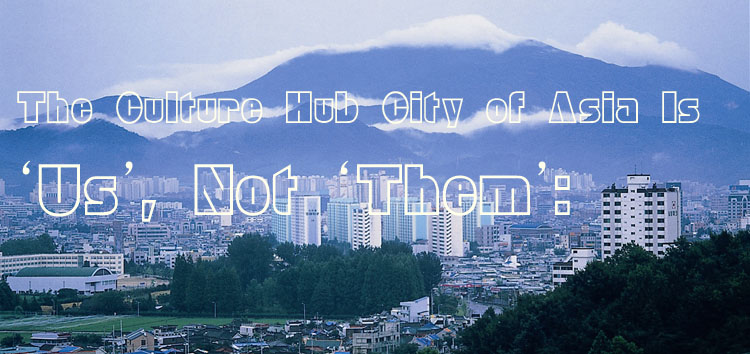<#281 Local Focus>

We Do not Need Supremacist Logos Anymore
By Kim, Dae-seung, Ph.D. in Public Administration,
Research Fellow at the Jeonnam Research Institute
Most public policies have lifecycles that begin with an expectation of good things to come, but end without ever accomplishing their intended goals. The state project for making Gwangju the Culture Hub City of Asia is doomed to the same fate. In 2002, Roh Moo-Hyun, then a Presidential candidate for the Democratic Party, made a campaign pledge that he will "develop Gwangju into a culture hub." Gwangju has since fallen into a vortex of confusion and discord both from within and without.
The magnitude resulting from Roh Moo-Hyun’s promise has gone beyond everyone's expectation. Many stakeholders have emerged arguing that their policy storylines are better than everyone else’s. So, if I can find a proper name for this phenomenon, it must be 'the turf of language games.'
I am one of the students who have kept an eye on this project since its birth. There have been many differences of opinion regarding this project, but one thing that all involved would agree with is that "we got lost." Many articles, including my own, were published on the Culture Hub City of Asia. However, all of these articles failed to fulfill the desires of the citizens of Gwangju. Our failure lies in the heated turf of language games and the discursive practices that have failed to accomplish anything.
This failure leads me to pose two questions regarding the Culture Hub City of Asia project: what is the problem? and what should we do? The first question needs a little bit of caution. You know why? I had several occasions to present articles on the Culture Hub City of Asia hosted by academic groups. During these presentations, I could feel a tension in the air. It appeared that by time the discourse coalitions were confronting each other ready to duel, their tongues were sharp as they zeroed in on the weakness of their foes.
Since then, I could not help wondering why they were so angry. My tentative conclusion was that the discourse groups were not willing to recognize and compromise with their counterparts. If that is so, why not? I have two narratives for that.
First, the supremacist psychology is working behind the wheel. Someone said to me that they might have a different 'episteme,' or mind-set. One day I was shocked at the remark by a famous scholarly activist in Korea. He said that "an aesthetic tyrant needs to be" in the Culture Hub City of Asia project. Each discourse group pretends that they are 'enlightened.' They are the successors to the enlightenment, finding their own identity as aesthetic supremacist on the Culture Hub City of Asia.
The second problem is more important than the first. Up until now, the Culture Hub City of Asia project has failed in terms of citizen engagement. The hustle and bustle of cultural policy-making we find over the past five years is supposedly based on a representative democracy. The discourse coalitions with different episteme on culture asserted that they were the genuine representatives of Gwangju citizens. Is that true? Hardly. Their actions proved different. The coalitions were obsessed with their own hidden interests. In the name of citizens each coalition demanded more share of the limited pieces of the Culture Hub City pie.
The results of language games among them are undesirable. Gwangju citizens were excluded from the discursive practices from the beginning. The Culture Hub City of Asia project has been driven by the small, but enlightened groups of supremacists. At length, 'the Culture Hub City of Asia project was not US, but THEM.' Therefore, apathy and swearing has now prevailed among citizens. It testifies that Gwangju citizens, from the outset, were not in the mind of policy makers in stark contrast to their high-pitched rhetoric.
Right now, the Culture Hub City of Asia project is in the process of making an action plan for Gwangju City. Construction of the Asia Culture Complex as the core zone of Gwangju city is expected to start soon with an accompanying seven zones. Several days ago, President Lee Myung Bak has promised to continue the Culture Hub City of Asia project. That remains to be seen.
In spite of the promises, without ironing out the problems aforementioned in advance, the Culture Hub City of Asia project will backfire sooner or later. We do not need aesthetic supremacist anymore. We need more citizen participation. Policy for the people should give way to policy by the people or with the people. That will make the Culture Hub City of Asia more legitimate, thus paving the way to a democratic and efficient policy implementation down the road.
I am sure that someone will doubt the practicality of my suggestions. However, regardless of what else happens, the representatives must remember that their role is to be the voice of the citizens at large. Citizens should come in at the beginning of the policy process and so-called representatives should serve as consultants or facilitators. Putting the cart before the horse has been the order of the day. For the sake of the people and the project it is time to set things right and put the horse before the cart right away.

